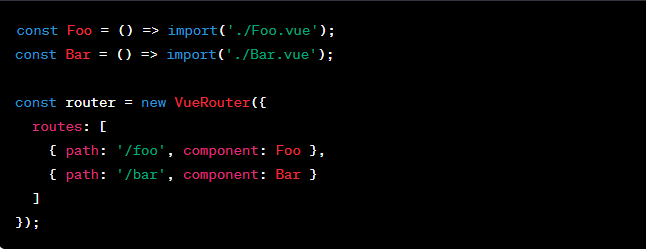Optimization in Vue.js: Tips & Techniques for Improving Vue.js Performance
Introduction:
Vue.js is a popular JavaScript framework that simplifies building user interfaces with its intuitive syntax, reactivity system, and component-based architecture.
Optimizing the performance of your Vue.js applications is crucial for providing a quick and seamless user experience. Performance is a crucial component of web development. We will explore various tips and techniques to optimize the performance of your Vue.js applications. By using these techniques, you can make sure that your application reacts smoothly, loads quickly, and the overall performance of your Vue.js projects is improved.
Code Splitting and Lazy Loading:
Code splitting is a technique that allows you to split your application’s JavaScript code into smaller chunks that are loaded on demand. Vue.js makes code splitting easy using dynamic imports and lazy loading.

By using dynamic imports, the component will be loaded only when it’s required, reducing the initial page load time and improving performance.
Vue Router Lazy Loading:

Lazy loading allows you to load routes and their associated components only when they are accessed by the user using dynamic imports. If your Vue.js application uses Vue Router for routing, you can take advantage of lazy loading to improve performance.
Optimize Component Rendering:
Vue.js provides several methods for improving component rendering. Here are some:
- When working with conditionally displayed components, use the “v-if “ directive instead of “v-show”. While “v-show” toggles the CSS display property only and “v-if” entirely inserts or removes the component from the DOM.
- Using the Key attribute when rendering lists of components. The Key helps Vue.js efficiently update and re-render components by preserving their state.
Optimize Computed Properties:
Computed properties are a powerful feature in Vue.js but can impact performance if not used efficiently. Avoid complex and computationally expensive logic in computed properties. Instead, use them to cache and optimize frequently used data. This way, Vue.js will only recompute the computed property when its dependencies change, improving overall performance.
Conclusion:
We explored several tips and techniques to help you optimize the performance of your Vue.js projects; by minimizing and bundling your code, lazy loading components, optimizing list rendering, and optimizing computed properties, you can significantly improve the performance of your Vue.js applications by using these techniques.
Don’t just read about technology – experience it firsthand. Schedule a call with us today!
If you still have questions, comment and join the discussion.

